Noseweek editor loses defamation case
Judge orders Martin Welz to pay R330,000 in damages plus legal costs to lawyer Leonard Katz
Leonard Katz of law firm Edward Nathan Sonnenberg has successfully sued Noseweek editor Martin Welz for defamation. Photo: Steve Kretzmann
Noseweek Editor Martin Welz and his publishing company, Chaucer Publications, have been ordered to pay R330,000 in damages to attorney Leonard Katz for the publication of articles and a front cover alleging he was the “man who stole justice”.
The articles related to allegations by Ian Brakspear, a Durban North businessman. Brakspear claimed that Katz, a director of Edward Nathan Sonnenberg (ENS) who was representing Nedprop, had through “fraudulent schemes” swindled him out of his family’s Cape wine farm through a “fraudulent” liquidation process.
Brakspear’s claims were tested in a lengthy trial before Judge Frans Kgomo who ruled in 2014 that he was “unbalanced and irrational” and cleared banks and lawyers he had implicated of any wrongdoing.
The judge, at the time, said his allegations were “wild, probably defamatory”.
Katz sued Welz for articles he penned in two editions of Noseweek in 2014 which contained an image of him with the caption: “The man who stole Justice”.
One of the articles was headed “Lennie the Liquidator makes mockery of the law”.
In it, Welz wrote that several ENS directors had “actively helped design the fraudulent schemes”. He questioned how it was possible for judges to tolerate the “likes of Katz” to continue practising as an officer of the court.
He further wrote: “You want what can’t legally be done? Agree to pay Lennie an extra million or three and he will pull it off, by hook or by crook.”
In his defamation action, which was heard by Western Cape High Court acting Judge Ncumisa Mayosi, Katz said the articles portrayed that he was a dishonest person, who was guilty of unprofessional conduct and was unfit to practice law.
Welz denied that the articles were defamatory and claimed that even if they were, the content was “substantially true”, in the public interest and amounted to fair comment.
He further stated that Noseweek readers would be familiar with the publication’s “uniquely free, irreverent and occasionally entertainingly cheeky style of writing”.
Welz represented himself during the trial, which began in February last year.
Chaucer Publications was represented by two advocates who were briefed only for the purposes of argument.
Judge Mayosi ruled that the articles were, indeed, defamatory of Katz and, from evidence presented to the court, that they were untrue.
The judge said that at the time that the articles were published, Welz was “fully aware there was no merit to Mr Brakspear’s complaint, that the allegation was unfounded, that it was not true but they proceeded to write and publish nevertheless.”
Referring to case law on defamation, the judge said: “I fail to see how their conduct can be said to have been reasonable.”
She said it appeared that Welz was not going to let the truth get in the way of what he considered to be a good story.
“It is not in the public interest, and can be of no public benefit, to write and publish untrue statements about an individual.”
With regard to the principles relating to the award of damages, the judge said the statements published were “highly defamatory”.
“Accusing any person, let alone an attorney of corruption and/or fraud, is about as serious and damaging an allegation as can be made.”
And Welz had continued to make the allegations “well into 2020”, when he promised potential funders for the litigation that he would “vindicate the truth”.
Even after the 2014 ruling of Judge Kgomo, and under threat of being sued by Katz, Welz had written and published that he was “not rattled at all”, claiming that the judgment contained half truths or “simply nonsense”.
He later wrote that Katz’s summons “was a gift”.
“It offers me the opportunity to fully unpack all the damning evidence in an open court room.”
He had also refused Katz’s offer to settle the defamation proceedings on the basis that he publish a retraction and apology.
The judge said Welz had not presented any evidence to establish the truth of what he had written.
“In addition, no evidence has been placed before this court demonstrating that his biting, derisory and condescending commentary in response to the Kgomo judgement was justified.
“The gift presented by Mr Katz’s summons failed to deliver the anticipated fruits.”
She said Welz and Chaucer had abused their powerful positions to launch a vicious unsubstantiated attack on Katz.
“They appear to have turned a blind eye to the injunction in Bogoshi [the leading case law matter on defamation] that members of the press should not labour under the impression that they have a licence to lower the standards of care which must be observed before defamatory matter is published.”
She ordered Welz and Chaucer to pay Katz’s legal costs.
Support independent journalism
Donate using Payfast

Don't miss out on the latest news
We respect your privacy, and promise we won't spam you.
Next: Immigrant traders demand to know why City of Cape Town has moved them
Previous: Man arrested for Table Mountain fire no longer faces arson charges
© 2021 GroundUp. This article is licensed under a Creative Commons Attribution-NoDerivatives 4.0 International License.
You may republish this article, so long as you credit the authors and GroundUp, and do not change the text. Please include a link back to the original article.
We put an invisible pixel in the article so that we can count traffic to republishers. All analytics tools are solely on our servers. We do not give our logs to any third party. Logs are deleted after two weeks. We do not use any IP address identifying information except to count regional traffic. We are solely interested in counting hits, not tracking users. If you republish, please do not delete the invisible pixel.

